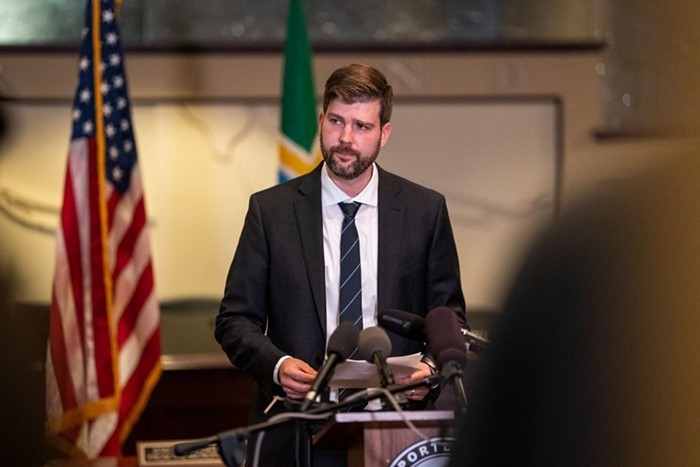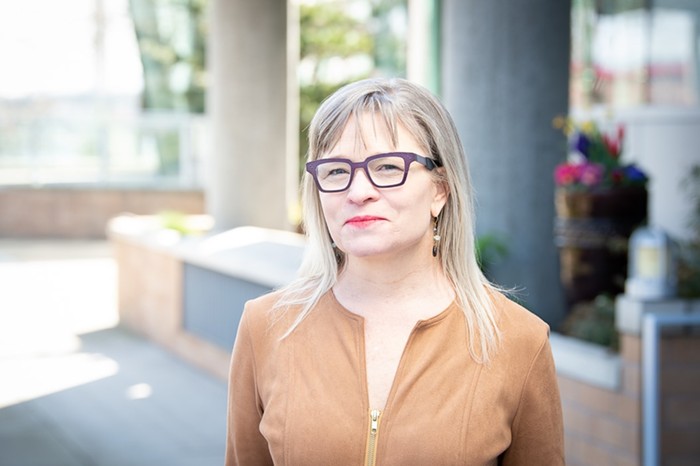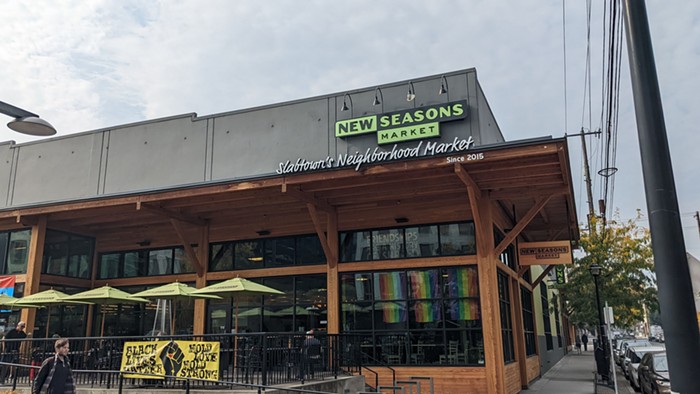
This article was produced as a collaboration between Bolts and the Portland Mercury.
Multnomah County District Attorney Mike Schmidt knows he has an image problem.
Schmidt, who took office during Portland’s racial justice protests in August 2020, says he feels squeezed between two sides—a common sentiment among prosecutors who have promised a progressive approach to the job, some of whom now face recall efforts and primary challengers. While right-leaning residents have blamed Schmidt for rising gun crime and an increase in visible homelessness in the region, many progressives who helped elect him now question his commitment to reforms that he campaigned on but hasn’t yet delivered, like restorative justice programs and sweeping sentencing reforms.
Now halfway through his first term, Schmidt is asking county officials to add $2.7 million to his office’s $44.8 million budget for a new program that he says aims to build trust with a skeptical community. Dubbed the Multnomah County DA’s Access Attorney Program (MAAP for short), Schmidt's proposal would assign four pairs of prosecutors total to the county’s four regions, focusing each attorney’s work on crimes taking place in their particular geographic area. Schmidt says those eight attorneys would share office space with local community groups and forge relationships that help the DA’s office better understand neighborhood-level issues impacting crime and, ideally, find solutions that go beyond police and prosecution.
“I think having us back into community spaces to build relationships, to show that we are doing the work and we do care… I think that can go a long way to actually work on community challenges that people are facing and also push back against that narrative that nobody’s doing anything, because it’s just not true,” Schmidt said during an interview with the Mercury about the program.
Some of Schmidt's local progressive critics, though, worry that the program would double down on the traditional tools of law enforcement to address Portland’s problems just as the county has made strides toward pursuing alternatives. They are concerned that MAAP would mark a retreat into old-school approaches at a time criminal justice reform is facing vigorous pushback from opponents throughout the country.
“The only tool that prosecutors have is punishment. We have a lot of significant challenges from housing to mental health in the community, but punishment isn't a good tool to respond to that.” - Kelly Simon, ACLU of Oregon legal director
In recent years, the county's board of commissioners has shifted funding from the DA’s office to other areas of county government to support more social programs, like behavioral health services and supportive housing. But Schmidt's proposal for neighborhood prosecutors is a large request for additional funding. The county’s board of commissioners is expected to consider the DA’s request in coming weeks and decide by the time of their annual budget vote on June 16, and three of the board’s five commissioners have already expressed their support of MAAP in public forums.
Schmidt's proposal isn’t a novel idea in Multnomah County, but rather the latest iteration of a neighborhood prosecutor program that garnered national attention for the local DA’s office in the 1990s. That earlier program, which dedicated particular prosecutors to individual neighborhood police precincts, was inspired by the tough-on-crime style of law enforcement that Schmidt has pledged to move the office away from—and thus he envisions something very different with his newest version.
With MAAP, Schmidt has proposed installing his neighborhood DAs in the offices of trusted nonprofits and community centers, an attempt to project the image of the DA as a community service provider rather than only an authority figure. If someone in the area is frustrated with repeated car thefts on their block, for example, they could arrange a meeting with their neighborhood prosecutor to flag the problem or learn what kind of evidence they could collect to help law enforcement in any ongoing cases. These prosecutors are also tasked with convincing the public that Schmidt's office takes crime seriously.
Schmidt’s revival of the neighborhood DA program has garnered cautious support from some community groups, while also alarming local civil rights leaders who aren’t convinced by the rebrand. Kelly Simon, legal director for the ACLU of Oregon, is worried that more resources to the DA’s office will only exacerbate racial disparities already seen in local charges and sentencing. Simon also said she was uncomfortable with Schmidt’s framing of prosecutors as a social service.
“The ‘access attorney’ frame is interesting to me, because DAs don't represent individuals impacted by crime, they represent the State of Oregon in every case they work on,” Simon said. “The only tool that prosecutors have is punishment. We have a lot of significant challenges from housing to mental health in the community, but punishment isn't a good tool to respond to that.”
Schmidt maintains that his neighborhood prosecutor program is not intended to increase prosecutions. “That will happen, a little,” he acknowledged. “But really though, what it’s about is having our prosecutors in the community who know what we’re working with—and we can partner with other organizations and come up with a solution… My intention is to be helpful, not more harmful.”
“We can look at the data, but that doesn’t change the fact that people don’t feel safe in our community. And that’s a problem.” - Mike Schmidt, Multnomah County District Attorney
The Multnomah County DA’s Neighborhood Unit was the first of its kind in the nation when it was created by then-DA Michael Schrunk in 1990. Schrunk created the unit in response to rising crime in Portland’s Lloyd District area, all characterized by Schrunk as “quality-of-life” crimes: car thefts, robberies, prostitution, dumping, and vandalism. Local businesses had lobbied Schrunk to create the program and even pitched in some funding for the new neighborhood prosecutors.
The neighborhood prosecutors worked to turn law enforcement-friendly Lloyd District residents and business owners into “citizen informants,” educating them on what kind of evidence prosecutors needed to convict someone for low-level crimes like drug dealing. A 1997 story on the program published in the urban policy magazine City Journal described the process this way: “Residents then watched, kept logs of traffic into houses suspected of drug activity, and contacted officers with their information.”
After crime fell in the Lloyd District, Schrunk got public funding to open eight additional neighborhood DA offices across the county. The program dovetailed with the increase of “broken windows policing” or “quality of life law enforcement” across the country, like stop-and-frisk in New York City, that disproportionately targeted people of color.
A 2016 investigation by Street Roots reported that neighborhood prosecutors often prioritized non-violent behavioral offenses that churned people through the local justice system. MCDA data obtained by the publication showed that 24 percent of people charged with “quality-of-life” crimes were Black, while less than 6 percent of Multnomah County’s population was Black. This data, paired with the public’s growing discomfort with private businesses covering a portion of the neighborhood DA salaries, slowly pushed the program out of favor until it ended under countywide budget cuts later that year.
Schmidt said he was inspired to rebuild his office’s neighborhood prosecutor division after talking with other prosecutors around the country at a recent DA conference. He says he modeled MAAP after a program in Cook County, Illinois, that places “community prosecutors” in neighborhoods across Chicago to help “problem-solve individual, neighborhood or community issues that may or may not be criminal in nature but impact the quality of life.” That program has had a proven impact on reducing the rate of violent crime, with a much smaller impact on property crimes.
Along with eight additional prosecutors, Schmidt has proposed funding for eight other positions to support the neighborhood DA offices—two victim advocates, an office assistant, a legal assistant, two investigators, a data analyst, and a “social service navigator” to help connect crime victims with resources. He says he plans on hiring experienced attorneys—either promoting from within his office or hiring new prosecutors—who won’t carry the full and oftentimes crushing caseloads shouldered by their colleagues at the county courthouse.
Schmidt says he hopes the program gives people whose concerns have historically been ignored by the office more access to prosecutors and their resources. He says neighborhood prosecutors will attend community meetings and other local events to meet people in the area and make themselves more available to the public. He called the program “a democratization of power.”
Schmidt says he also hopes the neighborhood DAs help ease current anxieties around crime—even if those worries are rooted in flawed assumptions. While homicides by gun have skyrocketed in Portland since Schmidt entered office, overall crime rates in Portland have held steady in that time period.
“We can look at the data, but that doesn’t change the fact that people don’t feel safe in our community,” said Schmidt. “And that’s a problem.”
“We’re supporting this program at this particular time under the leadership of someone who’s trying to create progressive change at the DAs office." - Nancy Haque, director of Basic Rights Oregon
Although it’s not yet clear where the MAAP offices might go, Schmidt has proposed placing them in community spaces across the county. Schmidt said he met with numerous community organizations, some of which have expressed cautious support for the idea, to get their feedback before proposing it to county officials.
“I’m really hoping they’ll be a good liaison to our community and a true resource,” said Nancy Haque, director of LGBTQ+ rights nonprofit Basic Rights Oregon (BRO). Haque said that, after years of watching victims of hate crimes and their families feel ignored by law enforcement, she would like to see MAAP attorneys truly act as victim advocates in the community.
“It does seem like there’s an opportunity for the DA’s office to create change by making themselves more of a resource for the LGBTQ community,” Haque said.
Haque added that BRO’s support of the program hinges on Schmidt’s involvement. “We’re supporting this program at this particular time under the leadership of someone who’s trying to create progressive change at the DAs office,” she said.
Other groups were even more cautious with their support for the idea. Social justice nonprofit Unite Oregon declined to be interviewed about MAAP, but sent the Mercury a statement saying the organization “supports the program at its early stage and will continue to evaluate its ability to impact the communities we serve in a positive way."
Moms Demand Action, the Northwest Carpenters Union, Portland Business Alliance, and Business for a Better Portland have issued more full-throated endorsements of the program. Like with the 1990s iteration of the neighborhood prosecutor program, business leaders are eager for the DA’s help, especially in the wake of the pandemic’s economic downturn.
“Many of our independent retail and restaurant members are struggling with the impacts of crime on their businesses,” said Ashley Henry, director of Business for a Better Portland. “We know that there is no single solution to these challenges, but ensuring that there is more connection between law enforcement and the community is certainly a critical step. Having an additional resource from the DAs office on the ground, in direct communication with businesses and neighbors about the issues they face, is among those steps.”
Schmidt, whose progressive proposals have often attracted criticism from local law enforcement, has garnered their support for MAAP. Portland Police Bureau spokesperson Nathan Sheppard told the Mercury in an email that the bureau would “embrace” the return of a neighborhood DA program.
“Having the help and guidance of the same attorneys who will be trying these cases in court increases the chances of a positive outcome for victims,” Sheppard wrote. “It's important to remember that the goal in arresting someone is not merely to book them into jail (many times suspects are out within hours) but to have the cases resolved with successful prosecution.”
“This program creates a misunderstanding that the DA’s office is working as counsel for communities, which is ethically dubious. Prosecutors can’t be a social worker." - Chris O'Connor, public defender
Some community organizations are skeptical of MAAP’s promises. Simon, with the ACLU of Oregon, fears that, despite Schmidt’s best intentions, the program could disproportionately prosecute marginalized communities for “quality of life” crimes.
“At the end of the day, the program is increasing the number of prosecutors in Multnomah County and putting those prosecutors in communities that have historically been harmed by prosecution practices,” Simon said. “If repair work is not done first to build trust, I’m afraid that will be repeated.”
Simon said she sees value in DAs doing more to understand the communities they work in, but she doesn’t believe that approach should be limited to just eight prosecutors.
“If we don’t require that kind of engagement from every prosecutor we will continue to see systemic racism, frankly,” Simon said.
Chris O’Connor, a longtime public defender currently with Multnomah Defenders Inc., worries about how the new program and messaging from the DA’s office might influence defendants. O’Connor says he already encounters clients in court who are often under the mistaken impression that the DA is on their side.
“People get confused about which attorney is working for you… We get that all the time,” O’Connor said. “This program creates a misunderstanding that the DA’s office is working as counsel for communities, which is ethically dubious. Prosecutors can’t be a social worker.”
O’Connor called Schmidt’s proposal a “PR stunt.” If the county genuinely wanted to help the community, he said it could use the MAAP funds to instead hire community lawyers to help advocate for people who aren’t familiar with the court system, or go further and help bankroll more public defender programs. Multnomah County is currently experiencing a historic deficiency in public defenders, to the point where people who can’t afford a lawyer are being held in jail for weeks without access to an attorney. On May 16, a group of Oregonians with criminal charges sued Governor Kate Brown and the state’s public defense department for violating their constitutional rights to an attorney in a reasonable amount of time.
“There are ways to fund access to legal services that don’t involve a [prosecutor],” O’Connor said. “It’s the wrong tool for the wrong problem.”



















